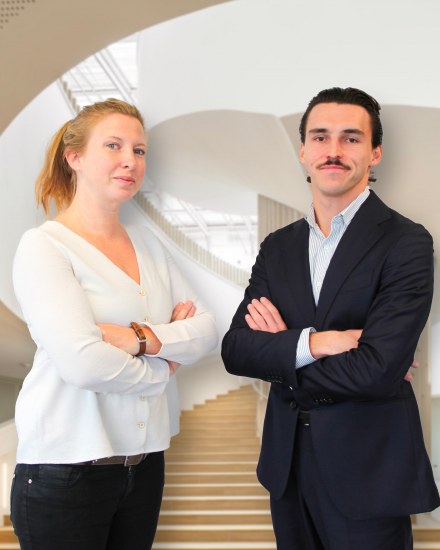Adrien Charruey and Marion Jullien (Data Scientist Super Intern and recently recruited for full-time position in Industry Intelligence & Strategic Corporate Planner at Dassault Systèmes, respectively) share their insights on the educational and professional path to becoming a Data Scientist, the role within a company, the challenges faced, and the skills required and developed along the way.

How did you reach your current positions?
Adrien: “My path was fairly traditional as as I aimed to become a Data Scientist from the start. I took a Bachelor’s in Applied Mathematics and Engineering, and during my second year of Engineering School I took the opportunity to specialize in Data Science. The goal was to blend my technical knowledge and background with business sense and the communications skills needed in the field.”
Marion: “My journey demonstrates that the Data Scientist/Analyst professionis not limited to one type of profile. I’ve been working at Dassault for over eight years now, starting in Financial Analysis and Transfer Pricing. Before joining the company, my background was in Law and Taxation.”
What challenges have you encountered so far?
Adrien & Marion: “Though we’re at different stages in our careers, the challenges are similar. You’ll deal with different datasets from those you’ll have encountered in school, plus you will need to handle pressure, stakeholder management, and working within a complex ecosystem. However, these should be viewed as growth opportunities rather than hurdles, as the role of Data Scientist really enables you to evolve into a strategic player within a company, rather than just executing tasks. This profession’s beauty really lies in being involved in the actual decision-making., not just reporting to leadership.
How would you differentiate a Data Scientist from a Data or Business Analyst?
Marion: “In short, a Data Scientist has a margin to set up their own processes and contribute to supporting the strategic direction of a company or even its future evolution. Being a Data Analyst is more about working with existing data and following pre-established processes. The Business Analyst is, by definition, working more closely within the corporate set-up, identifying needs and the required data.”
Can you describe a typical day in the life of a Data Scientist?
Adrien: “Like all good and stimulating jobs, no two days are the same. However, the typical approach involves managing various projects: This starts with recuperating and then cleaning and analyzing data, and then understanding the company’s strategic requirements. The next stage involves data visualization and reporting final recommendations. Keeping up with technological and technical advancements is crucial – you need to stay informed while doing your best on the job
What skills and qualities are necessary for success in the profession?
Adrien & Marion: “Project management is very important, and you need to quickly get proficient with complex data analysis tools used to support corporate strategies. You’ll often be working on project internal customed tools and platforms and will need to be capable of advocating approaches to data recuperation (data strategies - simpler), directly to senior management. Communication is therefore key as well. Don’t think for one minute that the Data Scientist works alone in their corner – understanding a business’ needs and coming up with appropriate solutions based on data analysis requires speedy comprehension of the desired strategy and explanation of the most desirable solution.”
What advice would you give to students and graduates considering this path?
Adrien: “passion for the field is crucial, which you can illustrate even further by running your own personal data-related projects in parallel. This approach certainly stood me in good stead when I was looking for an internship. Soft skills are also essential, as the job requires significant communication to understand a company’s needs as well as the final step of reporting your findings and recommendations.”
Marion: “Having a strong technical knowledge base is an absolute must, but I sincerely believe that recruiters are also looking for a certain mindset and intellectual curiosity and don’t forget to set up and maintain a relevant and effective professional network.”


